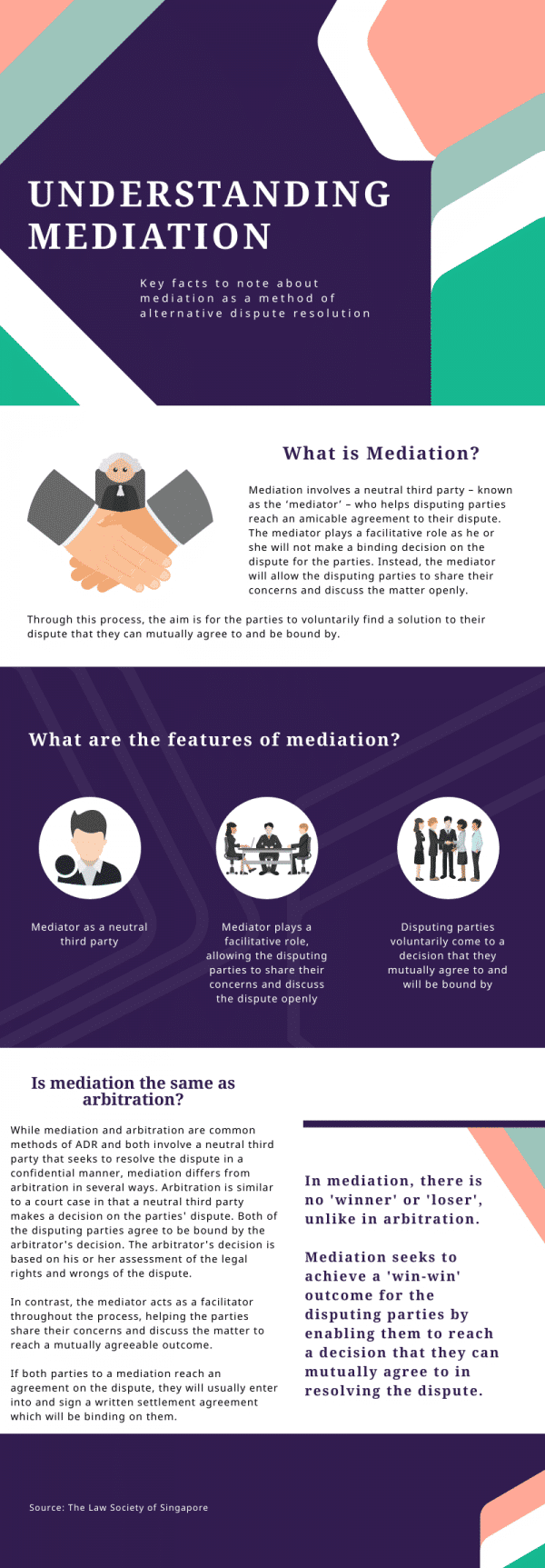Understanding Mediation
The information in the Legal Fact Check Service is provided as a public service by the Law Society of Singapore. The information presented on this site is strictly for information. It is not legal advice and should not be treated as an alternative to seeking legal advice from your lawyer. The information provided in the Legal Fact Check Service is not a definitive analysis of the subject and professional legal advice should always be taken before any course of action is pursued.
Whilst the information presented is considered to be correct at the date of publication, changes in circumstances after the date of publication may impact on the accuracy of the information. The Law Society of Singapore reserves the right to amend any content at any time, at its sole discretion, without prior notice.
The Law Society of Singapore shall not be held liable for any damage or loss of any kind, howsoever caused as a result (direct or indirect) of the use of the Legal Fact Check Service, including but not limited to any damage or loss suffered as a result of reliance on the contents contained in or available from this site.
Understanding Mediation
On 7 August 2019, Singapore made international legal history when the United Nations (UN) Convention on International Settlement Agreements Resulting from Mediation – otherwise known as the Singapore Convention on Mediation – opened for signatures. Singapore, the United States and China are among the forty-six countries that are signatories to this Convention. This event also drew attention to mediation, which is a common method of alternative dispute resolution (‘ADR’). What is the difference between mediation and other forms of ADR, such as arbitration? Here are some key facts to note about mediation.
Facts:
What is mediation?
Mediation involves a neutral third party – known as the ‘mediator’ – who helps disputing parties reach an amicable agreement to their dispute. The mediator plays a facilitative role as he or she will not make a binding decision on the dispute for the parties. Instead, the mediator will allow the disputing parties to share their concerns and discuss the matter openly. Through this process, the aim is for the parties to voluntarily find a solution to their dispute that they can mutually agree to and be bound by.
Is mediation the same as arbitration?
While mediation and arbitration are common methods of ADR and both involve a neutral third party that seeks to resolve the dispute in a confidential manner, mediation differs from arbitration in several ways.
Arbitration is similar to a court case in that a neutral third party makes a decision on the parties’ dispute. Both of the disputing parties agree to be bound by the arbitrator’s decision. The arbitrator’s decision is based on his or her assessment of the legal rights and wrongs of the dispute. In contrast, the mediator acts as a facilitator throughout the process, helping the parties share their concerns and discuss the matter to reach a mutually agreeable outcome.
In mediation, there is no ‘winner’ or ‘loser’, unlike in arbitration. Mediation seeks to achieve a ‘win-win’ outcome for the disputing parties. If both parties to a mediation reach an agreement on the dispute, they will usually enter into and sign a written settlement agreement which will be binding on them.
The infographic below outlines the key features of mediation as a form of ADR.


